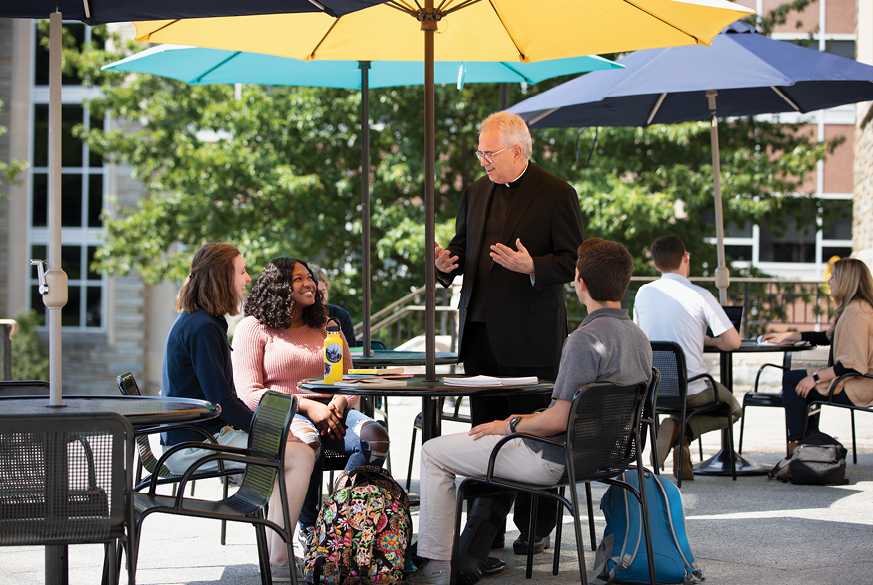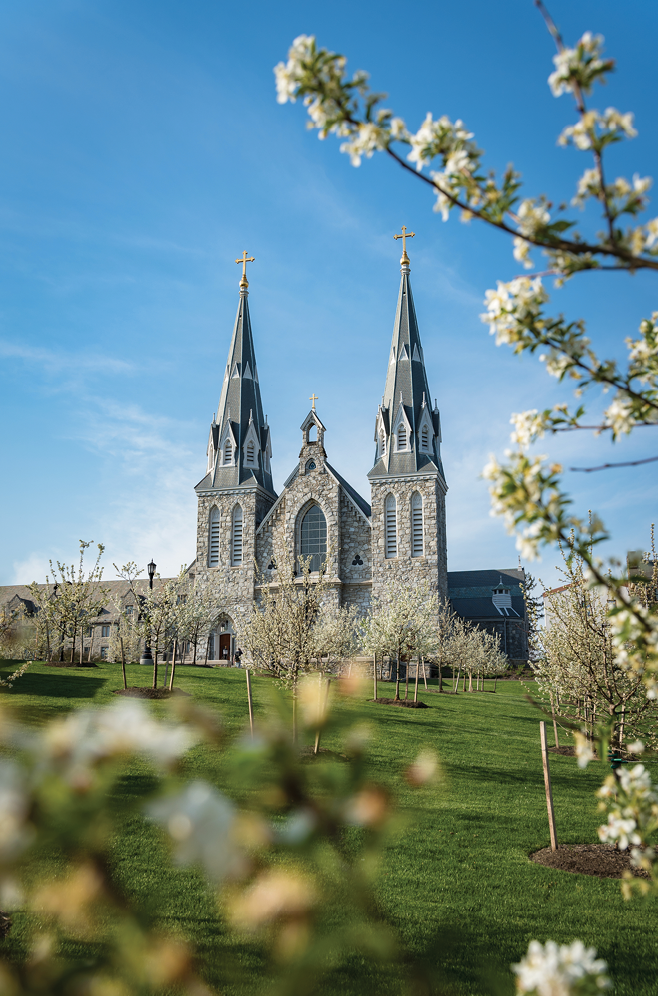- Home
- Media Kit
- Current Issue
- Past Issues
- Ad Specs-Submission
- Ad Print Settings
- Reprints (PDF)
- Photo Specifications (PDF)
- Contact Us

![]()
ONLINE

Rooted. Restless.
Editors’ Note
The Rev. Peter M. Donohue has served as Villanova University’s 32nd president since June 1, 2006. Born in the Bronx, New York and raised in Royal Oak, Michigan, Father Donohue earned a B.A., with a concentration in theatre and communication arts, from Villanova University in 1975 and was ordained an Augustinian priest in 1979. He holds an M.A. in theatre from the Catholic University of America, a M.Div. from the Washington Theological Union, and a Ph.D. in theatre from the University of Illinois at Urbana-Champaign. While pursuing his doctorate, Father Donohue taught theatre at the University of Illinois, where he received honors for outstanding teaching. He is a member of Phi Kappa Phi, the nation’s oldest, largest, and most selective all-discipline honor society. He is a tenured full professor at Villanova who served as chair of the University’s department of theatre from 1992 to 2006. Father Donohue annually directed musical theatre productions on campus, earning six Barrymore Award nominations and one Barrymore Award for Outstanding Direction of a Musical from the Theatre Alliance of Greater Philadelphia.
Institution Brief
Villanova University (villanova.edu) was founded in 1842 by the Order of St. Augustine. To this day, Villanova’s Augustinian Catholic intellectual tradition is the cornerstone of an academic community in which students learn to think critically, act compassionately and succeed while serving others. There are more than 10,000 undergraduate, graduate and law students in the University’s six colleges. Villanova has been ranked among the top 50 national universities by U.S. News & World Report and is one of the top 4 Catholic universities in the country. The University’s colleges continue to be recognized among the best in the country, including a #1 ranking of the Villanova School of Business in 2016 by Bloomberg Businessweek.

Father Donohue engaging with students at Villanova University
What have been the keys to Villanova’s success and how do you define what makes the university special?
The key to success is the people that are in various positions throughout the university. There is a great dedication to the institution. People really enjoy working here so it’s the kind of place where people often stay for a long time.
We have a great emphasis on building community at Villanova and people really feel a part of the process when it comes to decisions that are made here. They feel that they have input into the university’s future and direction, which leads to job satisfaction.
Your first 10-year strategic plan that focused on igniting the heart, inspiring the mind, and illuminating the spirit, was just completed. Will you discuss the impact of the plan as well as your expectations for the upcoming Rooted. Restless. 10-year strategic plan?
I think that the most recent plan, which we’ve just completed, was very successful. It accomplished what we wanted it to accomplish in that we initiated the plan to increase our national recognition and be reclassified from a Masters comprehensive regional institution to a national doctoral research university. In the U.S. News & World Report ranking, we had been the leader in the Northeast, holding the #1 position for 20-plus years, and we really felt that it was time to be on the national universities list which included many of our peer institutions.
As part of the strategic plan, we focused efforts around research work and a handful of doctoral programs, increasing the number of doctoral students and thereby the graduation rate of our doctoral students. This small shift was intended to increase the annual number of Ph.D.s that were graduating from Villanova in order to be reclassified as a national doctoral research university.
We weren’t certain how it would actually play out because we don’t have a say in changing our classification or category. However, we knew that if we put the right conditions in place, we would likely be reclassified.

St. Thomas of Villanova Church
Ultimately it worked and we were reclassified by the Carnegie Foundation. We also landed in a place that we were really pleased with in terms of our national recognition and our portfolio of research.
With our previous plan, we were also looking to increase the number of states and countries from which our students came. Previously, we had been a primarily Northeast-based institution, so we adjusted our admissions strategy to expand our geographic footprint and national presence. We now have students from every state represented here, as well as more international students. It took us a while to do it, which is why it was a 10-year plan, so it wasn’t as if it was happening overnight. I am very pleased with the results.
Moving into our new strategic plan, Rooted. Restless. there was a shift in terms of the way we approached the plan. Many of the previous plans didn’t involve any outside consultants. With the most recent plan, and now this new one, I felt it was important to get the perspective of individuals and experts outside of the Villanova community. We hired McKinsey, the consulting company, to assist us in developing this plan. They were very effective in getting us to speak about our goals and what we wanted to achieve. They continually reminded us that this is our plan and that we needed to create it, but they were very helpful in getting the university to identify who we are, who we aspire to be, where we saw the institution going, and what goals we wanted to accomplish. They were able to get us to articulate all of that.
One of the attributes of Rooted. Restless. that may set us apart from other institutions, is the amount of community involvement in this plan. Many of the initiatives in the plan resulted from the community input and engagement during the planning process. While McKinsey provided the supporting data and the information that we needed in terms of putting it all together, this plan was truly formulated by our community, so it was a different but highly effective approach.
How important has it been for Villanova to build a diverse and inclusive faculty and student population?
I think it’s extremely important and we see it here day in and day out. I would say that we’re still working on it. It is not an easy process. There is a lot of competition for good people from other institutions who are from diverse backgrounds. I firmly believe that, in order to create a diverse student population, we need to create a diverse faculty and staff population as well.
The new plan talks a lot about diversity, equity and inclusion. As we move forward, it is paramount that we, as an institution, concentrate on hiring and retaining a diverse faculty and staff in order to attract that diverse student body, because I really believe people will come to an institution when they see people like themselves here. They then feel they’re a part of it and that they’re included in some way because they see their own lives represented on campus in one way or another.
How do you define the purpose of Villanova University and its role in the community?
The university is grounded in the thought and spirituality of Saint Augustine. Being an Augustinian institution, his works and his thoughts are woven through everything we do, and he speaks frequently about community. The Augustinian order perceives the creation of community as one of our primary responsibilities and it was a fundamental commitment for Augustine.
Augustine believed that he became who he was through the influence of other people, the friends in his life particularly, and that’s how he got to know himself better. There is a great deal of emphasis at Villanova on how we contribute to the community, not only on campus, but beyond. Augustine speaks often, and it’s something that resonates throughout our community, that you take what you need and what is left over is for somebody else’s use. We are constantly looking at who we are becoming through our experiences on campus and our intersection with knowledge and faith, and how we use that in terms of servicing the needs of the common good.
We are very proactive about service outside of the campus community and how we can help certain people achieve the dreams and needs that they have. We look to use the blessings that we’ve been given to answer other’s prayers. It’s all very much directed outward.
How important is it to be innovative with the curriculum in order to prepare students to succeed in the workforce of the future?
I think one of the most important things we need to accomplish in terms of the dissemination of knowledge here is that we help people to become critical thinkers so they can face problems and think about them through various filters.
Preparing students for their time after graduation is critically important. They need to be individuals who can evaluate where they are, what they’re doing, how they’re doing it and who they’re doing it for. There is a focus on giving them the tools they need to create positive change in their personal and professional lives.
In terms of the curriculum and the classes that they take, the Augustine and Culture Seminar is the common thread that ties all our undergraduate students together. Regardless of major, Villanova students take this seminar, which is built upon the teachings, readings and lectures of St. Augustine. This seminar creates the foundation for everything that our students learn and experience during their time here and its one of the aspects that sets our students apart from their peers. Another area of emphasis at Villanova is interdisciplinary work and finding ways, either formal or informal, to expose our students to other disciplines and areas of study.![]()